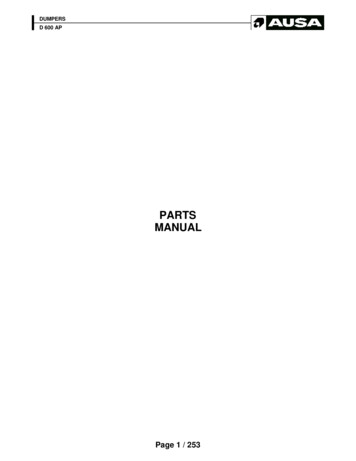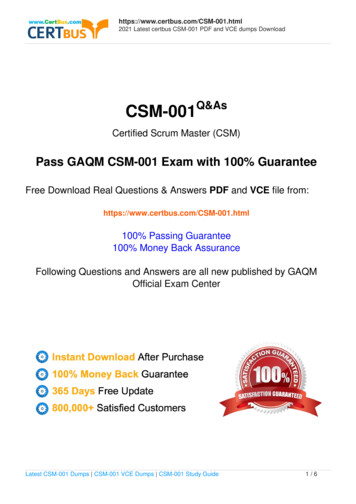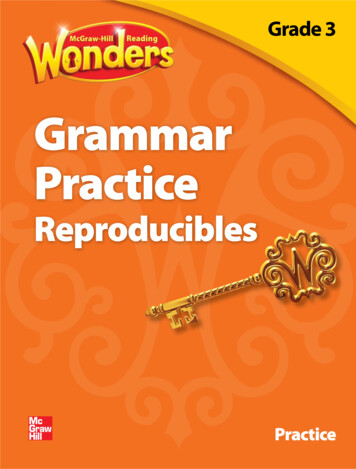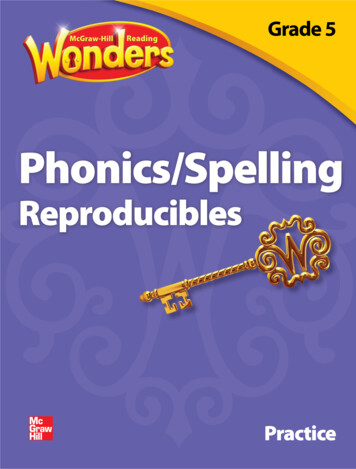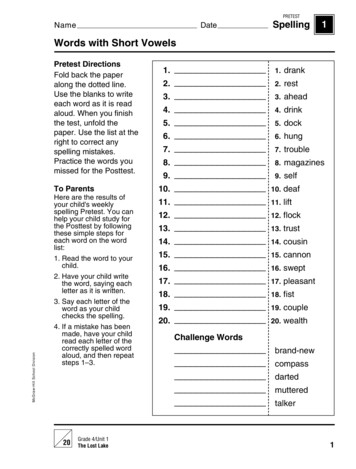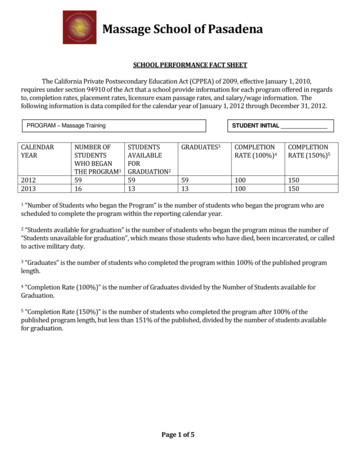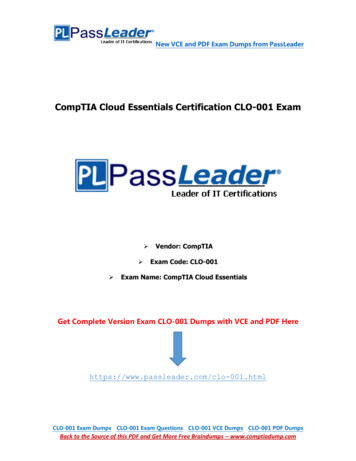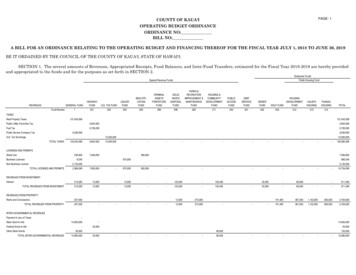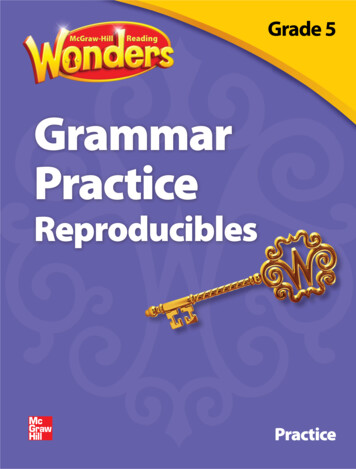
Transcription
Grade 5GrammarPracticeReproduciblesPractice
Copyright The McGraw-Hill Companies, Inc. Permission is granted to reproduce for classroom use.Grade 5GrammarPracticeReproduciblesPractice
Grade 5GrammarPracticeReproduciblesBothell, WA Chicago, IL Columbus, OH New York, NY
www.mheonline.com/readingwondersCopyright The McGraw-Hill Companies, Inc.All rights reserved. The contents, or parts thereof, may bereproduced in print form for non-profit educational use withReading Wonders, provided such reproductions bear copyrightnotice, but may not be reproduced in any form forany other purpose without the prior written consent of TheMcGraw-Hill Companies, Inc., including, but not limited to,network storage or transmission, or broadcast for distancelearning.Send all inquiries to:McGraw-Hill EducationTwo Penn PlazaNew York, NY 10121C
ContentsUnit 1 Eureka! I’ve Got It!Meeting a NeedSentences . . . . . . . . . . . . . . . . . . . . . . . . . . . . . . . . . . .Sentences . . . . . . . . . . . . . . . . . . . . . . . . . . . . . . . . . . .Mechanics . . . . . . . . . . . . . . . . . . . . . . . . . . . . . . . . . . .Proofreading . . . . . . . . . . . . . . . . . . . . . . . . . . . . . . . . .Test: Sentences . . . . . . . . . . . . . . . . . . . . . . . . . . . . . .12345Trial and ErrorSubjects and Predicates . . . . . . . . . . . . . . . . . . . . . . 6Subjects and Predicates . . . . . . . . . . . . . . . . . . . . . . 7Mechanics . . . . . . . . . . . . . . . . . . . . . . . . . . . . . . . . . . . 8Proofreading . . . . . . . . . . . . . . . . . . . . . . . . . . . . . . . . . 9Test: Subjects and Predicates . . . . . . . . . . . . . . . . 10Seeing for YourselfCompound Sentences . . . . . . . . . . . . . . . . . . . . . . .Compound Sentences . . . . . . . . . . . . . . . . . . . . . . .Mechanics . . . . . . . . . . . . . . . . . . . . . . . . . . . . . . . . . .Proofreading . . . . . . . . . . . . . . . . . . . . . . . . . . . . . . . .Test: Compound Sentences . . . . . . . . . . . . . . . . . .1112131415Complex Sentences . . . . . . . . . . . . . . . . . . . . . . . . .Complex Sentences . . . . . . . . . . . . . . . . . . . . . . . . .Mechanics . . . . . . . . . . . . . . . . . . . . . . . . . . . . . . . . . .Proofreading . . . . . . . . . . . . . . . . . . . . . . . . . . . . . . . .Test: Complex Sentences . . . . . . . . . . . . . . . . . . . .1617181920Run-on Sentences . . . . . . . . . . . . . . . . . . . . . . . . . . .Run-on Sentences . . . . . . . . . . . . . . . . . . . . . . . . . . .Mechanics . . . . . . . . . . . . . . . . . . . . . . . . . . . . . . . . . .Proofreading . . . . . . . . . . . . . . . . . . . . . . . . . . . . . . . .Test: Run-on Sentences . . . . . . . . . . . . . . . . . . . . .2122232425Copyright The McGraw-Hill Companies, Inc.InventionsTIME For Kidsiii
ContentsUnit 2 Taking the Next StepReaching a CompromiseKinds of Nouns . . . . . . . . . . . . . . . . . . . . . . . . . . . . .Kinds of Nouns . . . . . . . . . . . . . . . . . . . . . . . . . . . . . .Mechanics . . . . . . . . . . . . . . . . . . . . . . . . . . . . . . . . . .Proofreading . . . . . . . . . . . . . . . . . . . . . . . . . . . . . . . .Test: Kinds of Nouns . . . . . . . . . . . . . . . . . . . . . . . .2627282930Singular and Plural Nouns . . . . . . . . . . . . . . . . . . . .Singular and Plural Nouns . . . . . . . . . . . . . . . . . . . .Mechanics . . . . . . . . . . . . . . . . . . . . . . . . . . . . . . . . . .Proofreading . . . . . . . . . . . . . . . . . . . . . . . . . . . . . . . .Test: Singular and Plural Nouns . . . . . . . . . . . . . . .3132333435More Plural Nouns . . . . . . . . . . . . . . . . . . . . . . . . . . .More Plural Nouns . . . . . . . . . . . . . . . . . . . . . . . . . . .Mechanics . . . . . . . . . . . . . . . . . . . . . . . . . . . . . . . . . .Proofreading . . . . . . . . . . . . . . . . . . . . . . . . . . . . . . . .Test: More Plural Nouns . . . . . . . . . . . . . . . . . . . . . .3637383940Possessive Nouns . . . . . . . . . . . . . . . . . . . . . . . . . . .Possessive Nouns . . . . . . . . . . . . . . . . . . . . . . . . . . .Mechanics . . . . . . . . . . . . . . . . . . . . . . . . . . . . . . . . . .Proofreading . . . . . . . . . . . . . . . . . . . . . . . . . . . . . . . .Test: Possessive Nouns . . . . . . . . . . . . . . . . . . . . . .4142434445Prepositional Phrases . . . . . . . . . . . . . . . . . . . . . . . .Prepositional Phrases . . . . . . . . . . . . . . . . . . . . . . . .Mechanics . . . . . . . . . . . . . . . . . . . . . . . . . . . . . . . . . .Proofreading . . . . . . . . . . . . . . . . . . . . . . . . . . . . . . . .Test: Prepositional Phrases . . . . . . . . . . . . . . . . . . .4647484950Seeking the AnswerInvestigationsA Plan of ActionivCopyright The McGraw-Hill Companies, Inc.Making It Happen
Unit 3 Getting from Here to ThereCultural ExchangeAction Verbs . . . . . . . . . . . . . . . . . . . . . . . . . . . . . . . .Action Verbs . . . . . . . . . . . . . . . . . . . . . . . . . . . . . . . .Mechanics . . . . . . . . . . . . . . . . . . . . . . . . . . . . . . . . . .Proofreading . . . . . . . . . . . . . . . . . . . . . . . . . . . . . . . .Test: Action Verbs . . . . . . . . . . . . . . . . . . . . . . . . . . .5152535455Verb Tenses . . . . . . . . . . . . . . . . . . . . . . . . . . . . . . . .Verb Tenses . . . . . . . . . . . . . . . . . . . . . . . . . . . . . . . .Mechanics . . . . . . . . . . . . . . . . . . . . . . . . . . . . . . . . . .Proofreading . . . . . . . . . . . . . . . . . . . . . . . . . . . . . . . .Test: Verb Tenses . . . . . . . . . . . . . . . . . . . . . . . . . . .5657585960Main and Helping Verbs . . . . . . . . . . . . . . . . . . . . . .Main and Helping Verbs . . . . . . . . . . . . . . . . . . . . . .Mechanics . . . . . . . . . . . . . . . . . . . . . . . . . . . . . . . . . .Proofreading . . . . . . . . . . . . . . . . . . . . . . . . . . . . . . . .Test: Main and Helping Verbs . . . . . . . . . . . . . . . . .6162636465Linking Verbs . . . . . . . . . . . . . . . . . . . . . . . . . . . . . . .Linking Verbs . . . . . . . . . . . . . . . . . . . . . . . . . . . . . . .Mechanics . . . . . . . . . . . . . . . . . . . . . . . . . . . . . . . . . .Proofreading . . . . . . . . . . . . . . . . . . . . . . . . . . . . . . . .Test: Linking Verbs . . . . . . . . . . . . . . . . . . . . . . . . . .6667686970Irregular Verbs . . . . . . . . . . . . . . . . . . . . . . . . . . . . . .Irregular Verbs . . . . . . . . . . . . . . . . . . . . . . . . . . . . . .Mechanics . . . . . . . . . . . . . . . . . . . . . . . . . . . . . . . . . .Proofreading . . . . . . . . . . . . . . . . . . . . . . . . . . . . . . . .Test: Irregular Verbs . . . . . . . . . . . . . . . . . . . . . . . . .7172737475Being ResourcefulPatternsCopyright The McGraw-Hill Companies, Inc.TeamworkTIME For Kidsv
ContentsUnit 4 It’s Up to YouSharing StoriesPronouns and Antecedents . . . . . . . . . . . . . . . . . . .Pronouns and Antecedents . . . . . . . . . . . . . . . . . . .Mechanics . . . . . . . . . . . . . . . . . . . . . . . . . . . . . . . . . .Proofreading . . . . . . . . . . . . . . . . . . . . . . . . . . . . . . . .Test: Pronouns and Antecedents . . . . . . . . . . . . . .7677787980Kinds of Pronouns . . . . . . . . . . . . . . . . . . . . . . . . . . .Kinds of Pronouns . . . . . . . . . . . . . . . . . . . . . . . . . . .Mechanics . . . . . . . . . . . . . . . . . . . . . . . . . . . . . . . . . .Proofreading . . . . . . . . . . . . . . . . . . . . . . . . . . . . . . . .Test: Kinds of Pronouns . . . . . . . . . . . . . . . . . . . . . .8182838485Pronoun-Verb Agreement . . . . . . . . . . . . . . . . . . . .Pronoun-Verb Agreement . . . . . . . . . . . . . . . . . . . .Mechanics . . . . . . . . . . . . . . . . . . . . . . . . . . . . . . . . . .Proofreading . . . . . . . . . . . . . . . . . . . . . . . . . . . . . . . .Test: Pronoun-Verb Agreement . . . . . . . . . . . . . . .8687888990DiscoveriesTake ActionConsider Our Resources9192939495Express YourselfPronouns and Homophones . . . . . . . . . . . . . . . . . . 96Pronouns and Homophones . . . . . . . . . . . . . . . . . . 97Mechanics . . . . . . . . . . . . . . . . . . . . . . . . . . . . . . . . . . 98Proofreading . . . . . . . . . . . . . . . . . . . . . . . . . . . . . . . . 99Test: Pronouns and Homophones . . . . . . . . . . . . 100viCopyright The McGraw-Hill Companies, Inc.Possessive Pronouns . . . . . . . . . . . . . . . . . . . . . . . .Possessive Pronouns . . . . . . . . . . . . . . . . . . . . . . . .Mechanics . . . . . . . . . . . . . . . . . . . . . . . . . . . . . . . . . .Proofreading . . . . . . . . . . . . . . . . . . . . . . . . . . . . . . . .Test: Possessive Pronouns . . . . . . . . . . . . . . . . . . .
Unit 5 What’s Next?New PerspectivesClauses . . . . . . . . . . . . . . . . . . . . . . . . . . . . . . . . . . .Clauses . . . . . . . . . . . . . . . . . . . . . . . . . . . . . . . . . . .Mechanics . . . . . . . . . . . . . . . . . . . . . . . . . . . . . . . . .Proofreading . . . . . . . . . . . . . . . . . . . . . . . . . . . . . . .Test: Clauses . . . . . . . . . . . . . . . . . . . . . . . . . . . . . .101102103104105Complex Sentences . . . . . . . . . . . . . . . . . . . . . . . .Complex Sentences . . . . . . . . . . . . . . . . . . . . . . . .Mechanics . . . . . . . . . . . . . . . . . . . . . . . . . . . . . . . . .Proofreading . . . . . . . . . . . . . . . . . . . . . . . . . . . . . . .Test: Complex Sentences . . . . . . . . . . . . . . . . . . .106107108109110Adjectives . . . . . . . . . . . . . . . . . . . . . . . . . . . . . . . . .Adjectives . . . . . . . . . . . . . . . . . . . . . . . . . . . . . . . . .Mechanics . . . . . . . . . . . . . . . . . . . . . . . . . . . . . . . . .Proofreading . . . . . . . . . . . . . . . . . . . . . . . . . . . . . . .Test: Adjectives . . . . . . . . . . . . . . . . . . . . . . . . . . . .111112113114115Adjectives That Compare . . . . . . . . . . . . . . . . . . . .Adjectives That Compare . . . . . . . . . . . . . . . . . . . .Mechanics . . . . . . . . . . . . . . . . . . . . . . . . . . . . . . . . .Proofreading . . . . . . . . . . . . . . . . . . . . . . . . . . . . . . .Test: Adjectives That Compare . . . . . . . . . . . . . .116117118119120Comparing with Good and Bad . . . . . . . . . . . . . .Comparing with Good and Bad . . . . . . . . . . . . . .Mechanics . . . . . . . . . . . . . . . . . . . . . . . . . . . . . . . . .Proofreading . . . . . . . . . . . . . . . . . . . . . . . . . . . . . . .Test: Comparing with Good and Bad . . . . . . . . .121122123124125Better TogetherOur Changing EarthCopyright The McGraw-Hill Companies, Inc.Now We KnowTIME For Kidsvii
ContentsUnit 6 Linked InJoining ForcesAdverbs . . . . . . . . . . . . . . . . . . . . . . . . . . . . . . . . . . .Adverbs . . . . . . . . . . . . . . . . . . . . . . . . . . . . . . . . . . .Mechanics . . . . . . . . . . . . . . . . . . . . . . . . . . . . . . . . .Proofreading . . . . . . . . . . . . . . . . . . . . . . . . . . . . . . .Test: Adverbs . . . . . . . . . . . . . . . . . . . . . . . . . . . . . .126127128129130Adverbs That Compare . . . . . . . . . . . . . . . . . . . . . .Adverbs That Compare . . . . . . . . . . . . . . . . . . . . . .Mechanics . . . . . . . . . . . . . . . . . . . . . . . . . . . . . . . . .Proofreading . . . . . . . . . . . . . . . . . . . . . . . . . . . . . . .Test: Adverbs That Compare . . . . . . . . . . . . . . . . .131132133134135Negatives . . . . . . . . . . . . . . . . . . . . . . . . . . . . . . . . . .Negatives . . . . . . . . . . . . . . . . . . . . . . . . . . . . . . . . . .Mechanics . . . . . . . . . . . . . . . . . . . . . . . . . . . . . . . . .Proofreading . . . . . . . . . . . . . . . . . . . . . . . . . . . . . . .Test: Negatives . . . . . . . . . . . . . . . . . . . . . . . . . . . . .136137138139140Sentence Combining . . . . . . . . . . . . . . . . . . . . . . . .Sentence Combining . . . . . . . . . . . . . . . . . . . . . . . .Mechanics . . . . . . . . . . . . . . . . . . . . . . . . . . . . . . . . .Proofreading . . . . . . . . . . . . . . . . . . . . . . . . . . . . . . .Test: Sentence Combining . . . . . . . . . . . . . . . . . . .141142143144145Prepositional Phrases . . . . . . . . . . . . . . . . . . . . . . .Prepositional Phrases . . . . . . . . . . . . . . . . . . . . . . .Mechanics . . . . . . . . . . . . . . . . . . . . . . . . . . . . . . . . .Proofreading . . . . . . . . . . . . . . . . . . . . . . . . . . . . . . .Test: Prepositional Phrases . . . . . . . . . . . . . . . . . .146147148149150Getting AlongAdaptationsMaking a DifferenceviiiCopyright The McGraw-Hill Companies, Inc.Out in the World
Grammar: SentencesName A sentence is a group of words that expresses a complete thought.It begins with a capital letter and ends with a punctuation mark. A sentence fragment is a group of words that does not express acomplete thought. A statement is a sentence that tells something. It ends with a period. A question is a statement that asks something. It ends with a questionmark.Read each group of words. If it is a sentence, add the proper punctuation mark.If it is not a complete sentence, write fragment.1. My mother walked into the kitchen2. Looked out the window3. One of my sisters4. What were they looking atCopyright The McGraw-Hill Companies, Inc.5. A deer stood in the yard6. Underneath the apple tree7. We watched quietly8. The deer looked up9. Did it see us10. Ran off across the lawnGrammar Grade 5 Unit 1 Week 11
Grammar: Commands and ExclamationsName A command is a sentence that tells or asks someone to do something. Itends with a period or an exclamation point. An exclamation expresses strong feeling. It ends with an exclamationpoint.Add the proper punctuation to the end of each sentence. Then write whether thesentence is a statement, question, command, or exclamation.1. Where are the maps2. I had them in my backpack3. Help me look for them4. We don’t want to get lost5. I’m so angry about losing them6. Can we find the way home on our own7. Did we pass by that tree earlier today9. Climb up that hill10. The view from up there is amazing2 Grammar Grade 5 Unit 1 Week 1Copyright The McGraw-Hill Companies, Inc.8. I remember those strange rocks as well
Grammar: Punctuate SentencesName A sentence is a group of words that expresses a complete thought.A sentence begins with a capital letter and ends with a punctuationmark. A statement ends with a period. A question ends with a questionmark. A command can end with a period or an exclamation point.An exclamation ends with an exclamation point.Rewrite each sentence by putting capital letters and punctuation marks wherethey belong.1. did you hear about the elephants outside2. they are coming to town for the fairCopyright The McGraw-Hill Companies, Inc.3. go over to the window to see them4. this year’s fair will be the best ever5. how much do elephants eat each dayGrammar Grade 5 Unit 1 Week 13
Grammar: ProofreadName A sentence is a group of words that expresses a complete thought.A sentence begins with a capital letter and ends with a punctuationmark. A statement ends with a period. A question ends with a questionmark. A command can end with a period or an exclamation point.An exclamation ends with an exclamation point.Proofread the paragraph. On the lines below, correct any fragments or mistakes insentence capitalization and punctuation.last night my sister wanted to go to the movies? I wanted to go with her. what wasstopping us. I had to finish my math homework first. The hardest problems ever.I asked my sister to wait for me? what do you think she did. She helped me figure out theanswers. made it to the show just in timeCopyright The McGraw-Hill Companies, Inc.4 Grammar Grade 5 Unit 1 Week 1
Grammar: SentencesNameA. Read each group of words. If it is a sentence, add the proper punctuation mark.If it is not a complete sentence, write fragment.1. Over by the new sports field2. My friends and I decide to race3. How long will it take to run a mile4. My friend’s new sneakers5. That is my best time everB. Add the proper punctuation to the end of each sentence. Then write whetherthe sentence is a statement, question, command, or exclamation.6. Do you want to race again7. Use this watch to record our time8. We will run five laps this timeCopyright The McGraw-Hill Companies, Inc.9. Are you ready10. My heart is pounding like crazyGrammar Grade 5 Unit 1 Week 15
Grammar: Subjects and PredicatesName The simple subject is the main noun or pronoun that names the subjectof the sentence. The complete subject includes all of the words that tell whom or whatthe sentence is about. The simple predicate is the verb that tells exactly what the subject doesor is. The complete predicate is the verb and all of the words that tell whatthe subject does or is.After each sentence, write whether the underlined word or words are the simplesubject, complete subject, simple predicate, or complete predicate.1. My grandparents live on an island.2. A small boat travels there every hour.3. The entire ride takes about twenty minutes.4. My family visits them every summer.6. My grandmother likes to paint the ocean.7. I am learning how to paddle a kayak.8. My oldest sister has started a shell collection.9. I swim nearly every day.10. Days at the beach are the best ever!6 Grammar Grade 5 Unit 1 Week 2Copyright The McGraw-Hill Companies, Inc.5. We stay for about a week.
Grammar: Compound Subjects and PredicatesName A compound subject is two or more subjects that share the same verb.The subjects are usually joined by a conjunction such as and or or. A compound predicate contains two or more predicates that have thesame subject. Compound subjects and predicates can use coordinating conjunctions(and, or) or correlative conjunctions (either/or, neither/nor).After each sentence, write whether the underlined words are a compound subjector compound predicate. Circle each conjunction.1. The students arrive and sit down.2. The teacher and the students open their books.3. The boy or the girl will read first.4. The class listens and takes notes.5. Either the teacher or the principal will speak.Copyright The McGraw-Hill Companies, Inc.6. The cafeteria opens and serves lunch.7. The students neither rush nor hurry.8. The pizza and the pasta are the favorite meals.9. Do you or your friends enjoy salads?10. Can either my friend or I help clean up?Grammar Grade 5 Unit 1 Week 27
Grammar: CommasName Use commas to separate three or more words or phrases in a series. Appositives are often set off by commas. Commas set off introductory words, such as yes, no, and thank you.Rewrite each sentence correctly by putting commas where they belong.1. The school’s sports teams include baseball soccer and football.2. My brother sister and father will attend today’s game.3. Mr. Tompkins our coach will lead the team onto the field.4. Yes we love it when people sing the school song!8Grammar Grade 5 Unit 1 Week 2Copyright The McGraw-Hill Companies, Inc.5. Our team got the ball raced down the field and scored a goal.
Grammar: ProofreadName Compound subjects and predicates can use coordinating conjunctions(and, or) or correlative conjunctions (either/or, neither/nor). Use commas to separate three or more words or phrases in a series. Use commas to set off appositives and introductory words insentences.Proofread the paragraph. On the lines below, correct mistakes in the use ofconjunctions and commas.Copyright The McGraw-Hill Companies, Inc.My parents have hired a tutor to help me with my reading writing and spelling.I also need help with science my hardest subject. The tutor, and I work together mostafternoons. We most often meet on Monday, Tuesday, and, Thursday. She and I eitherread together, or work on my homework problems. No she doesn’t give me the answers.My teachers parents and tutor are all proud of my progress.Grammar Grade 5 Unit 1 Week 29
Grammar: Subjects and PredicatesNameA. After each sentence, write whether the underlined word or words are a simplesubject, compound subject, simple predicate, or compound predicate.1. The squirrels and the chipmunks are gathering acorns.2. The daylight hours grow shorter every day.3. Leaves fall and cover the ground.4. Our town’s farmers harvest their crops.5. Many of them pick corn and sell it in town.B. Rewrite each sentence. Place commas where they belong.6. My father prepares a salad soup and main dish for dinner.7. My aunt uncle and cousins will join us this evening.8. Yes the house will be filled with all kinds of activity!10. Do you think my sister brother or I should sing along?10 Grammar Grade 5 Unit 1 Week 2Copyright The McGraw-Hill Companies, Inc.9. My mother a trained musician will play the piano.
Grammar: Compound Sentences and ConjunctionsName A simple sentence expresses one complete thought. A compound sentence contains two simple sentences joined by acomma and a conjunction. A conjunction joins words or groups of words. The words and, but, andor are conjunctions.Write whether each sentence below is simple or compound. Circle eachconjunction.1. The dog barked, and I woke up instantly.2. Something was tapping on my window.3. Was the noise real, or was I still dreaming?4. A bright light flashed, and I ducked under the covers.5. The dog ran down into the basement.Copyright The McGraw-Hill Companies, Inc.6. I called the dog, but he wouldn’t come back.7. My parents heard me and came into my room.8. They both seemed calm, or I would have kept hiding.9. There were strong winds, and a power line had snapped.10. That explained both the tapping and the bright light.Grammar Grade 5 Unit 1 Week 311
Grammar: Run-on SentencesName A run-on sentence joins together two or more sentences that should bewritten separately. You can correct a run-on sentence by rewriting it as a compoundsentence.Correct each run-on sentence below by writing it as a compound sentence.1. The official waves the flag the race begins!2. The driver pushes the gas pedal the car zooms forward.3. She speeds around the curve she doesn’t lose control.4. The other racers chase her their cars can’t catch up.12Grammar Grade 5 Unit 1 Week 3Copyright The McGraw-Hill Companies, Inc.5. The race is soon over she wins another trophy.
Grammar: Punctuation in Compound SentencesName When you correct a run-on sentence, use a comma before and, but, oror if the subject in each independent clause is different. To coordinate two closely related sentences without using a conjunction,use a semicolon (;).Correct each run-on sentence. Use commas and semicolons where needed.1. There is a concert this weekend we want to go.2. It’s our favorite band we have to see them!3. Will you buy the tickets should I pick them up?Copyright The McGraw-Hill Companies, Inc.4. We want seats in the front row they are sold out.5. Our seats are in the back we’ll have a great time anyway.Grammar Grade 5 Unit 1 Week 313
Grammar: ProofreadName Rewrite a run-on sentence as two separate sentences or as acompound sentence. To coordinate two closely related sentenceswithout using a conjunction, use a semicolon (;). When you correct a run-on sentence, use a comma before and, but,and or if the subject in each independent clause is different.Proofread the paragraph. On the lines below, correct any run-on sentences ormistakes in punctuation.My father drove up to the theater I stepped out of the car. Would it be a great show?Or would I forget all my lines? I had rehearsed every night, my sister had even helpedwith the hardest scenes. Would all that hard work pay off? Some people waited atthe ticket booth others were going inside. My stomach felt like it was full of frogs butI headed to the stage door anyway. The cast was counting on me I couldn’t let themdown.Copyright The McGraw-Hill Companies, Inc.14Grammar Grade 5 Unit 1 Week 3
Grammar: Compound SentencesNameA. Write whether each sentence below is simple or compound. If it is compound,circle the conjunction.1. The volunteers arrived at the shelter after the storm.2. Some brought food, and others delivered water.3. I wanted to help, but my parents had other plans.4. They wanted to check on our grandparents first.5. Should I join them, or should they go on their own?B. Rewrite each run-on sentence as a compound sentence.6. The mayor told us his plan we listened very carefully.7. We all wanted to help some of us were needed elsewhere.8. A news van arrived a camera crew came into the shelter.Copyright The McGraw-Hill Companies, Inc.9. They took many pictures a reporter spoke to the mayor.10. We were in good shape there was still much to do.Grammar Grade 5 Unit 1 Week 315
Grammar: Sentence CombiningName Coordinating conjunctions join two words or word groups of the samegrammatical rank or importance (e.g., two nouns, two independentclauses). The coordinating conjunctions and, but, and or can be used tocreate a compound sentence. Subordinating conjunctions tell where, when, why, or how. Somecommon subordinating conjunctions are after, although, as, because,before, if, since, so that, until, when, and while.Circle the conjunction in each sentence below. Then write whether it is acoordinating or subordinating conjunction.1. My dad looks great when he wears a suit.2. I gave him a tie, and he wears it all the time.3. It’s his favorite because it reminds him of home.4. He took me to work one day, and I sat at his desk.5. I wanted to attend a meeting, but he wouldn’t let me.7. After we ate lunch, we went on a sales call.8. He gave me some advice before we went inside.9. I had to be polite, or he would send me to the car.10. We both laughed since I’m always polite to everyone.16 Grammar Grade 5 Unit 1 Week 4Copyright The McGraw-Hill Companies, Inc.6. I stayed in his office until he returned.
Grammar: Complex SentencesName A complex sentence is a sentence that contains two related clausesjoined by a conjunction other than and, but, or or. Subordinating conjunctions can appear at the beginning or inthe middle of a complex sentence. If the sentence begins with asubordinating conjunction, a comma should follow the last word of thedependent clause.Use the subordinating conjunction in parentheses to combine the two simplesentences into one complex sentence.1. I was worried about the dog. She wouldn’t eat. (because)2. I told my mother. We called the vet. (after)Copyright The McGraw-Hill Companies, Inc.3. The dog walked away. We were still on the phone. (while)4. She was acting suspicious. I followed her. (since)5. I was concerned. She led me to a bag of food she had eaten. (until)Grammar Grade 5 Unit 1 Week 417
Grammar: CommasName Use a comma before a conjunction to separate two independent clausesin compound sentences. In complex sentences that begin with dependent clauses, add a commaafter the last word of the dependent clause.Use the conjunction in parentheses to create one compound or complex sentencefrom the two simple sentences. Use commas correctly.1. My grandmother called. No one was home. (but)2. I had a spare moment. I called her back. (when)3. She had exciting news. I begged her to tell me. (and)4. She wanted it to be a surprise. I promised to keep it secret. (because)18Grammar Grade 5 Unit 1 Week 4Copyright The McGraw-Hill Companies, Inc.5. She had won a contest. She was taking us all on a trip! (since)
Grammar: ProofreadName Use a comma before a conjunction to separate two independent clausesin compound sentences. In complex sentences that begin with dependent clauses, add a commaafter the last word of the dependent clause.Proofread the paragraph. On the lines below, correct mistakes in the use ofconjunctions and commas.Copyright The McGraw-Hill Companies, Inc.When he heard a branch snap behind him. The explorer stopped in his tracks.Since he had just discovered the ruins he didn’t know where to turn. Something madea growling noise and his heart raced with fear. Before he could turn around someonespoke. “I told you to stay at the camp but here you are,” said his father. “Now we’ll haveto wait here, until the others return.”Grammar Grade 5 Unit 1 Week 419
Grammar: Complex SentencesNameA. Circle the conjunction in each sentence. Then write whether the sentence iscompound or complex.1. Since I am so tall, I signed up for basketball.2. I played well until I hurt my ankle.3. The doctor checked the ankle, but the injury wasn’t serious.4. If it feels better by Monday, I can practice again.5. I’ll sit on the bench during games while it heals.B. Use the subordinating conjunction in parentheses to create a complexsentence from the two simple sentences.6. The buzzer sounded. The players jumped for the ball. (as)7. We passed the ball. Our fastest player could run with it. (so that)8. The second half began. We were leading the game. (until)10. We were about to score again. Time ran out. (when)20Grammar Grade 5 Unit 1 Week 4Copyright The McGraw-Hill Companies, Inc.9. The coach had an idea. She called us over. (because)
Grammar: Run-on Sentences and FragmentsName A sentence fragment is a group of words that does not express acomplete thought. A run-on sentence joins together two or more sentences that should bewritten separately.After each sentence, write whether it is a sentence fragment or a run-on sentence.1. She was born in 1945 she grew up in Maine.2. Took long walks along the shore.3. After moving from place to place.4. She studied biology it interested her.5. One of her most trusted friends.6. She went to Africa she made a huge discovery.Copyright The McGraw-Hill Companies, Inc.7. The scientist wrote a book it was very popu
Grammar Grade 5 Unit 1 Week 2 7 Grammar: Compound Subjects and Predicates After each sentence, write whether the underlined words are a compound subject or compound predicate. Circle each conjunction. 1. The students arrive and sit down. 2. The teacher and the students open their bo
